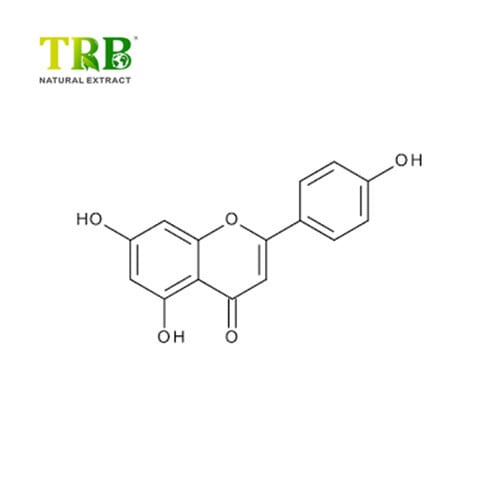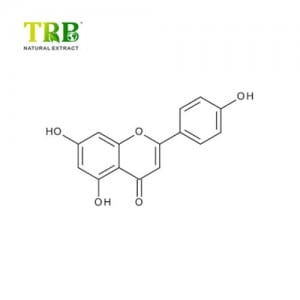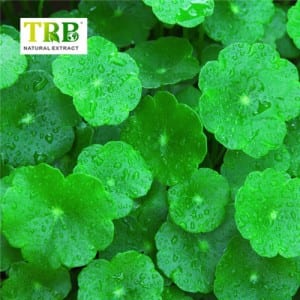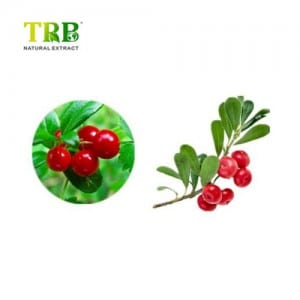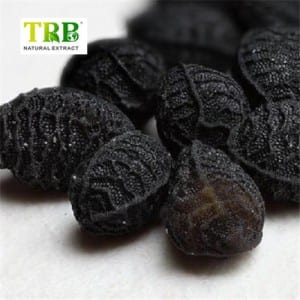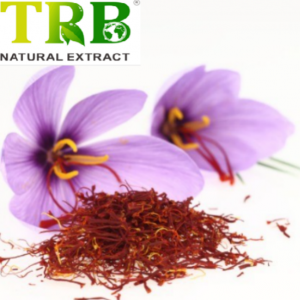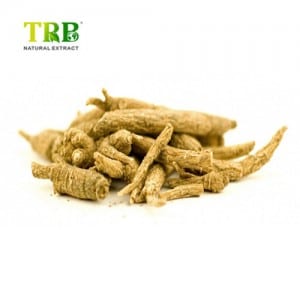Product Name:Celery leaf extract Apigenin 98%
Latin Name:Apium graveolens L.
CAS No:520-36-5
Plant Part Used:Leaf
Ingredient:Apigenin
Assay:Apigenin 98.0% by HPLC
Colour:Brown to yellow powder with characteristic odor and taste
GMO Status:GMO Free
Packing: in 25kgs fiber drums
Storage:Keep container unopened in cool, dry place,Keep away from strong light
Shelf Life:24 months from date of production
Anti-tumor effect
Apigenin plays an essential role in cancer prevention by inducing apoptosis in various cell lines.
Ovarian cancer:
Some research was found that apigenin could inhibit the growth, proliferation, and transfer of ca-ov3 (human ovarian cancer cell); it induces apoptosis of ca-ov3 through keeping the cancer cells stasis in G2/M phase. The effect is related to time and dose.
Pancreatic cancer:
Apigenin can inhibit the proliferation of pancreatic cancer cells. Apigenin starves the tumor by reducing the source of glucose, which is the food on which cancers cells live. Besides, Apigenin can improve the effectiveness of the chemotherapy drug- gemcitabine.
Chemo-sensitization
It was found that apigenin in low content had a low cytotoxic effect and could not induce human acute myeloid leukemia (hl-60) cells to apoptosis effectively. However, apigenin can enhance the inhibitory effect of cisplatin (DDP) on hl-60 cell proliferation while combining with different concentrations of DDP. So Apigenin may have chemotherapy-sensitization effect on hl-60; Low concentrations of apigenin can also reduce the resistance of hl-60 cells to chemotherapy-induced apoptosis, which may be related to the down-regulation of NF-κB and BCL-2. (NF-KB is a kind of protein complex that controls DNA transcription, the production of cytokines and cell survival; BCL-2 is encoded in the body through the BCL2 gene, it is the original member of the BCL-2 regulatory proteins family that can regulate cell death )
Liver protection
Apigenin can reduce liver injury induced by ischemia-reperfusion through antagonizing lipid peroxidation and scavenging free radicals.
Apigenin can reduce liver injury caused by oxidative stress due to its potent antioxidant and anti-inflammatory activities.
Pharmacological experiments have proved that apigenin has an apparent protective effect on alcohol-induced liver/hepatocyte injury, and its primary mechanism is related to the inhibition of CYP2E1 expression in the liver/hepatocyte.
Prevent osteoporosis
Apigenin inhibits osteoblastogenesis, osteoclastogenesis, and also prevents bone loss.
Apigenin protects bone tissue by reducing bone loss in the body.
Some studies related to the MC3T3-E1, an osteoblast precursor cell line derived from Mus musculus (mouse) calvaria, found that apigenin can inhibit the TNF-α, IFN-γ, and then induced the secretion of several cytokines that promote osteoclast formation.
Apigenin also inhibited the differentiation of 3T3-L1 adipose precursor cells into adipocytes strongly, therefore inhibiting the differentiation attendant inhibition adipocyte differentiation-induced IL-6, MCP-1, lectin product.
Apigenin inhibits the differentiation of osteoclasts from RAW264.7 cell lines and then inhibits the formation of multinucleated osteoclasts. It can also induce osteoclast apoptosis and inhibit bone resorption.
Anti-inflammatory and anti-oxidant activity
Apigenin restrains the inflammation process, increases the IL-10 levels and normalizes the oxidative stress parameters
Apigenin inhibits pro-inflammatory cytokines and induces the anti-inflammatory cytokine production.
Some literature suggests that apigenin alleviates tissue inflammation induced by oxidative stress in tissues by modulating various oxidative stress markers, interleukins, blood enzyme markers, and expression of several other related enzymes.
Product Overview
Apigenin 98% (CAS 520-36-5) is a high-purity flavonoid derived from natural sources such as chamomile, celery, and parsley, or synthesized under controlled conditions. With a molecular formula of C₁₅H₁₀O₅ and a molecular weight of 270.24, it exhibits exceptional biochemical properties, including antioxidant, anti-inflammatory, and anticancer activities, making it a versatile compound for advanced biomedical research .
Key Features
- High Purity & Quality
- Purity: ≥98% verified by HPLC and third-party testing .
- Physical Form: Light yellow crystalline powder with a solubility of up to 25 mg/mL in DMSO, 15 mg/mL in ethanol, and limited solubility in aqueous buffers .
- Stability: Stable for ≥4 years when stored at -20°C in powder form .
- Multifaceted Bioactivities
- Antioxidant: Scavenges free radicals, reducing oxidative stress .
- Anti-inflammatory: Inhibits COX-2, iNOS, and NF-κB pathways .
- Anticancer: Induces G2/M cell cycle arrest, suppresses tumor angiogenesis (HIF-1α/VEGF), and promotes apoptosis in cancer cells .
- Neuroprotective: Enhances cognitive function and protects neurons from oxidative damage .
- Broad Research Applications
- Cancer Research: Chemoprevention, apoptosis induction, and metastasis inhibition .
- Neurodegenerative Studies: Alzheimer’s, Parkinson’s, and cognitive enhancement .
- Cardiovascular Health: Reduces myocardial injury biomarkers (AST, LDH, CK) .
- Skin Health: Anti-aging and photoprotection via collagen synthesis .
Technical Specifications
| Parameter | Details | Reference |
|---|---|---|
| CAS Number | 520-36-5 | |
| Molecular Formula | C₁₅H₁₀O₅ | |
| Purity | ≥98% (HPLC, UV/Vis) | |
| Solubility | 25 mg/mL in DMSO, 15 mg/mL in ethanol | |
| Storage | -20°C (powder), -80°C (solutions) | |
| Heavy Metals | ≤10 ppm (Pb, As ≤2 ppm) |
Safety & Handling
- Warnings: May cause skin/eye irritation (H315, H319). Avoid inhalation and direct contact .
- Usage: For research purposes only. Not for human or veterinary use .
- Documentation: Comprehensive SDS and CoA (Certificate of Analysis) provided for each batch .
Why Choose Our Product?
- Rigorous QC: Batch-specific CoA with HPLC, mass spectrometry, and heavy metal screening .
- Global Compliance: Meets USP25, ISO, and EU regulatory standards .
- Custom Solutions: Available in 25 mg–1 g quantities and 10 mM DMSO stock solutions .
Ordering Information
- Contact: Email info@trbextract for quotes, bulk orders, or collaboration opportunities .
- Shipping: Worldwide delivery with blue ice packaging to ensure stability .
- Keywords: Apigenin 98%, CAS 520-36-5, anticancer flavonoid, neuroprotective agent, HPLC-verified purity.
- : Biomedical research, natural compounds, antioxidant supplements, cancer therapeutics.
